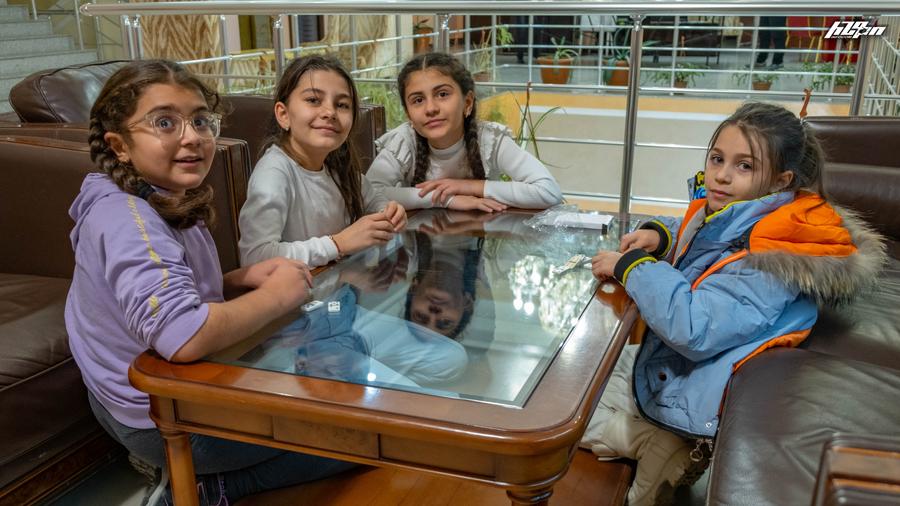
Daddy says "Don't be afraid, everything will be fine"։ Children from Artsakh who remained in Goris are waiting for good news
Compassion: this is a word, the sensual layers of which are most visibly revealed during these five days. Or not at all. It may not be easy to feel the people who are miles away, surrounded by an inch of land, when there is an opportunity to choose the best bread, when the Internet does not freeze, and when you don't think whether you will get through the winter with the existing wood or not.
I repeat and ask you to read slowly, word by word, close your eyes, and try to imagine people, one by one. Azerbaijanis closed the only road connecting Artsakh to Armenia. 120.000 people have been under blockade for five days. 1.100 people, including more than 270 children, cannot return home.
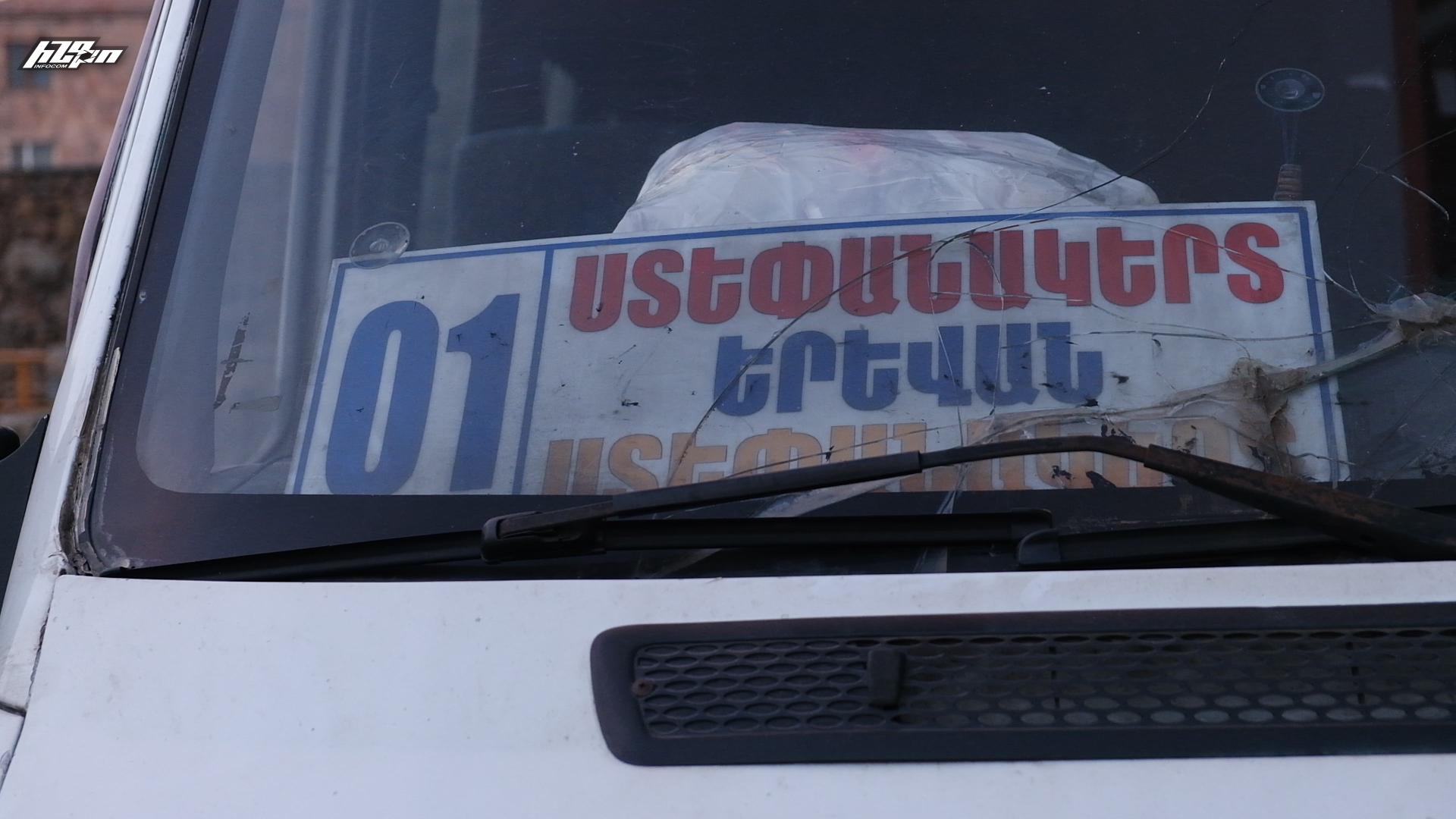
I meet 4 of these 270 children in one of the hotels in Goris. 10-year-old Greta, her sister, 8-year-old Angelina, 9-year-old Asya, and 8-year-old Tatev are playing dominoes at the table in the hallway. I ask them to teach me too, and they start to explain without giving each other a turn: this can stick to this, this can stick to this, and we start playing together. These girls did not know each other until they were forced to stay in a hotel due to the blockade, although they all live in Stepanakert. During these last four days, they became friends, and agreed that when they go back, they will definitely remain friends. I suggest that they exchange numbers right now, and find each other on Facebook, so that they don't suddenly lose each other.
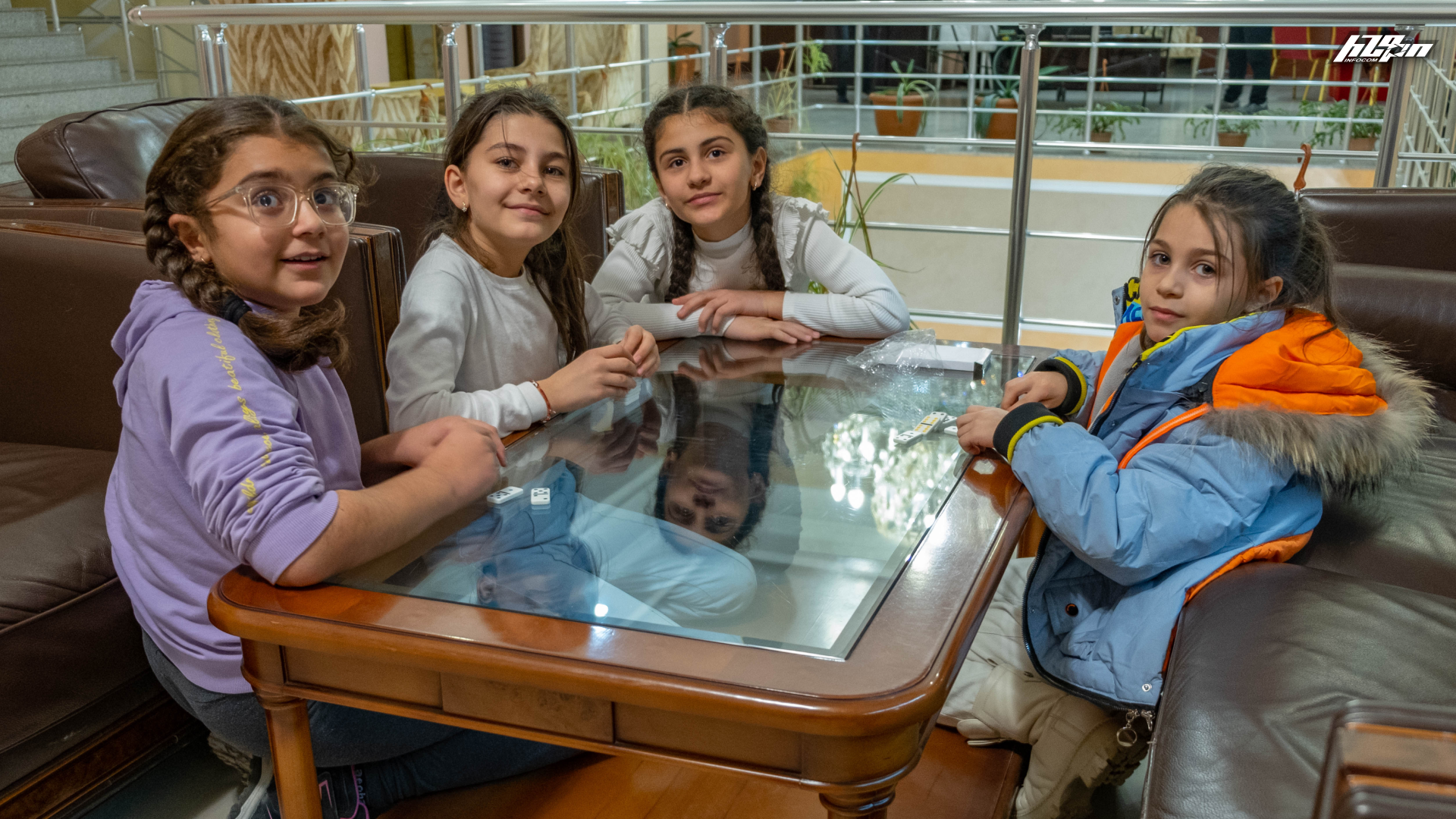
From left to right: Asya, Greta, Tatev, Angelina
The children say that they were not afraid when they learned about the closure of the road. Only little Angelina admits that she was a little scared. Then Tatev continue, saying that they were a little worried about how they would go, but they were not afraid of the Azerbaijanis.
Tatev went to embroidery lessons in Stepanakert, this is her favorite hobby. And Angelina practices gymnastics. She came to Yerevan with her mother and sister for competitions and took third place. The sister immediately says that she won first place in the previous competitions. Then the blue-eyed Angelina shows us somersaults and some tricks, moving as light as a feather.
Tatev's parents and brother stayed with him in Goris, while her grandmother and aunt are under blockade in Stepanakert. "Grandma says that it would be good if we open the roads as soon as possible, let's go as soon as possible, otherwise she won't be able to do it alone, they turned off the gas there, it's very difficult for them too." (The material was ready for publication when it was reported that the gas supply was restored in Artsakh).
And the father is waiting for Greta and Angelina in Stepanakert. They say they miss him a lot. "Well, we are nothing, again, we are out of the country, but our father, grandmothers, and grandfathers are there in the blockade, we are nothing," says Angelina with special insight to the great man, looking down half-smiling. Her sister continues: "[Dad] says don't be afraid, everything will be fine, everything will be fine."
Tatev says that at least they found each other here, otherwise he would be very sad alone.
Asya, who likes drawing the most and who explains the logic of dominoes to me, is a very self-confident girl. With her wavy hair in thick braids, she is the first to answer that she was not afraid of this tense situation. Her father, grandmother, and grandfather are waiting for her in Artsakh. She says that although they are worried, they "give courage", they say that the road will open soon, and he will go to them.
Greta and Angelina's mother, Armine Aghajanyan, leans on the windowsill and follows our conversation with a smile. Armine is from Nor Aygestan or Chaylu village of Martakert region. In the 1990s, the village of Chaylu remained under the control of the enemy, and the villagers founded a new village, NorAygestan. But with the tripartite agreement of November 9, this village also came under the enemy's control. Armine got married and lives in Stepanakert.
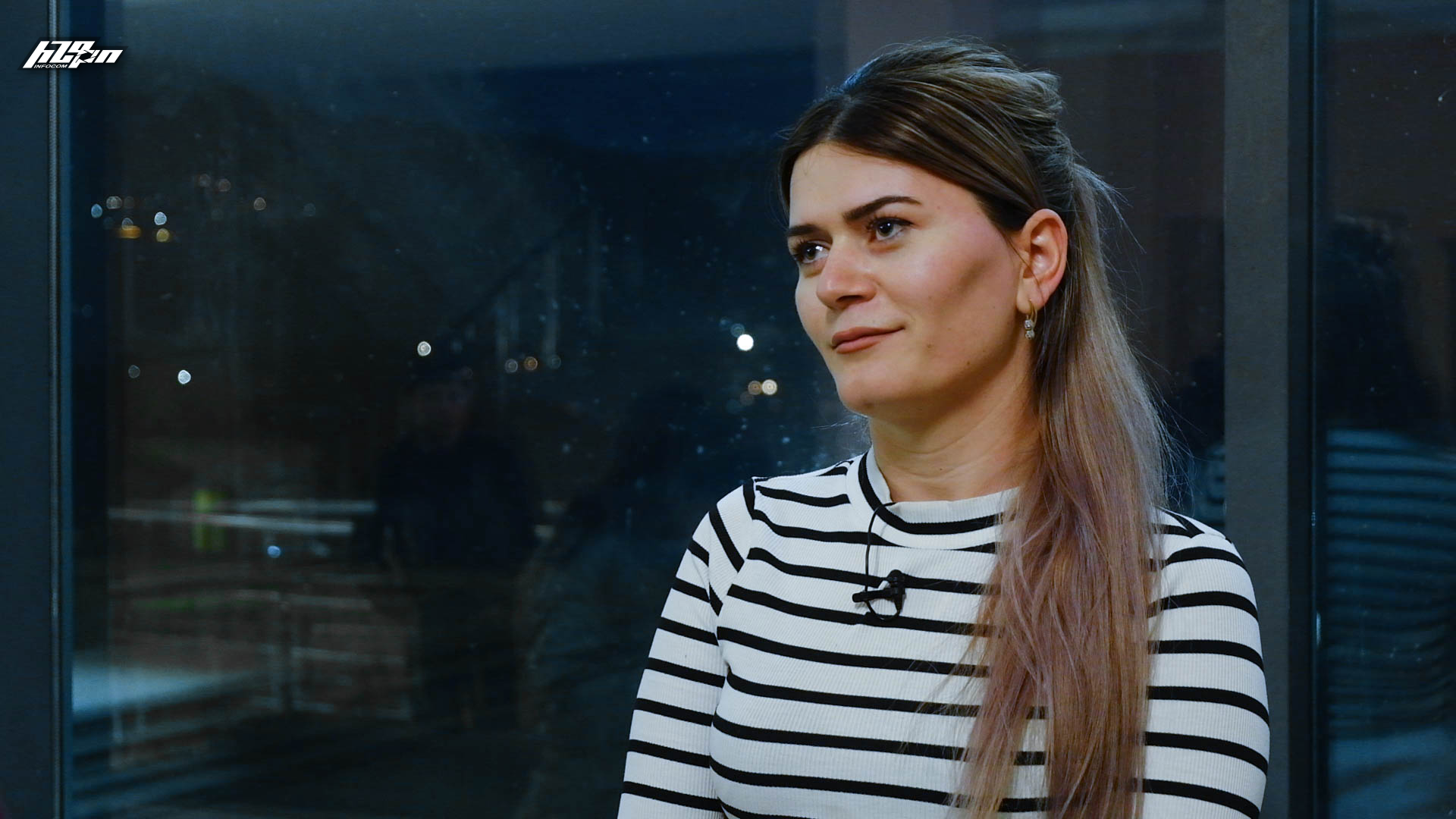
Armine Aghajanyan
He tells that he brought the children to Yerevan for gymnastics competitions, after which they boarded a transport and headed home to Stepanakert. But on the way, they already learned that the Azerbaijanis cut off the connection. Hoping that the road will be opened soon, like last time, they came to Goris. And they have been here for five days.
"The Turks did something like this again, they blocked the road once, so we came to Goris hoping that they would open it in a few hours, but they didn't."
Armine works in the republican hospital, she informed her colleagues that they stayed on the road. She says that, of course, everyone approaches the problem with understanding.
When I ask which of her relatives remained besieged in Artsakh, she says her husband and immediately adds: "All of them are our Artsakh people, they are all ours, I consider them relatives to me."
Armine is sure that the Azerbaijanis have blocked the road to get what they want, but, he says, none of them are afraid of them: "We know that this is a temporary thing, they may block the road again, they want something else. We will stay here as long as necessary until the road is opened. I want to say that we will not give anything anymore, they just want to scare us, it is their job again, they are used to scaring us with such actions, but no one is afraid, the children are not afraid either, they just have to go to school, I am at work, is an obstacle to that, but we will stay as long as necessary until the way is opened," he says and notes that the international structures do not intervene, do not react.
"I would like them to intervene quickly, discuss our Karabakh issue, and find a solution. We just want peace in our lovely little Artsakh. I am with everybody, I am with our Artsakh people, I want none of them to be broken, everything will be fine," she concluded.
Evening comes in Goris. Men gather in hotel courtyards and discuss the situation, but there is no noise. There is no noise at all in Goris. Six-year-old Avet and three-year-old Marian are waiting for their father, Mkhitar Ananyan, in their house in Mets Shen village of Martakert, who is one of the hundreds who did not manage to return home. Mkhitar is a physics, science, and chess teacher at Mets Shen school. A few days ago, he came to Yerevan for health reasons, the day before returning, the Azerbaijanis cut off the road, and Mkhitar has to stay in Goris.
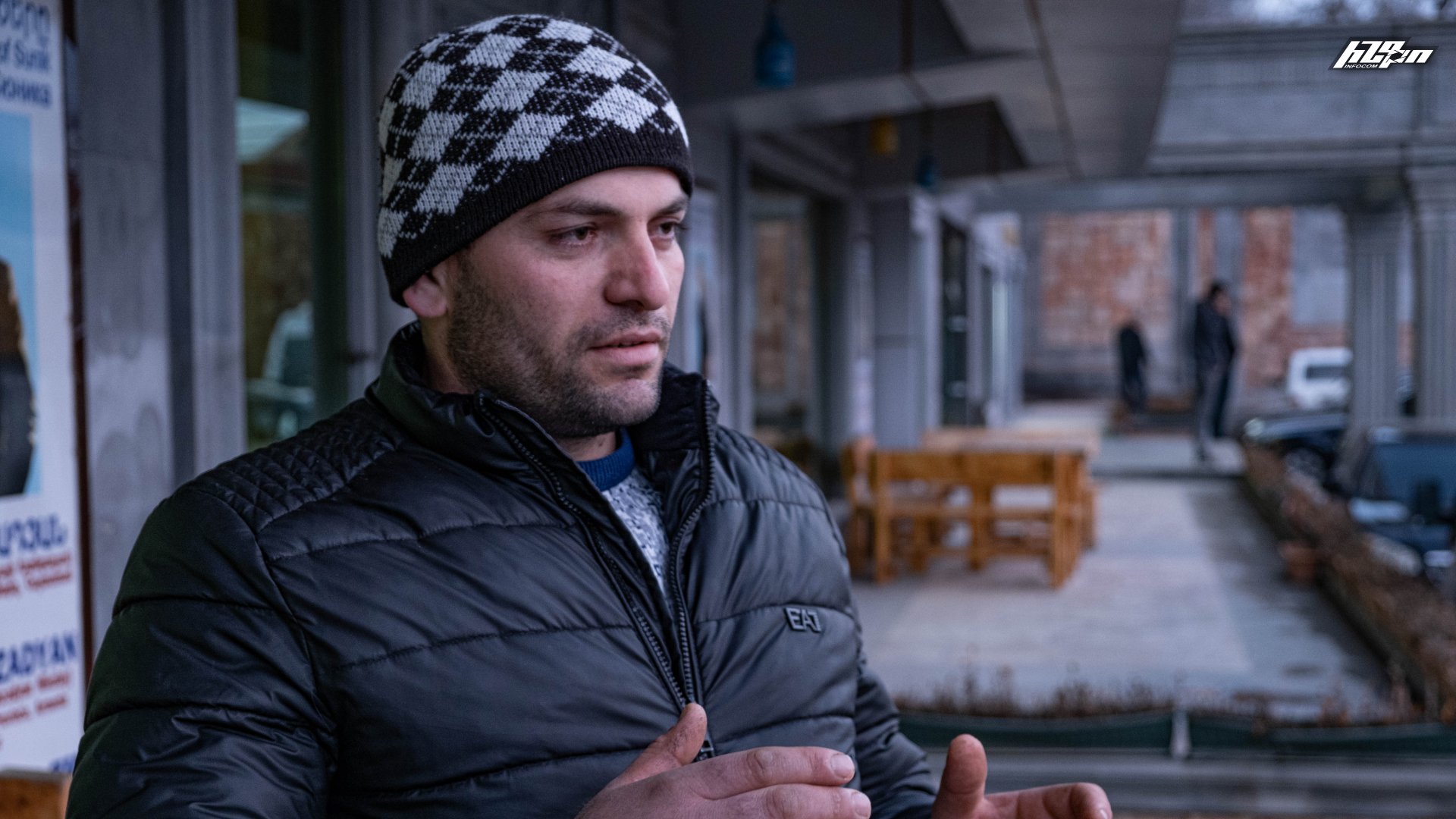
Mkhitar Ananyan
"Until today, we are waiting here with great hope that the road will be opened, we will go. We don't want Yerevan, because our relatives are in Karabakh, in more serious danger, we want to reach our children a day earlier. I have two children. We encourage them more, it's clear: children and women think a little more, of course," says Mkhitar, but expresses hope that this too can be overcome, they will overcome it.
Mkhitar considers unity to be the most important thing in this situation. He says that not everyone should take a step from his point of view, but in unison, so that it is possible to get out of the crisis. "I would urge them not to be depressed by all this, this is also an obstacle that can be overcome, we must try to get out of this situation."
Hayarpi Baghdasaryan

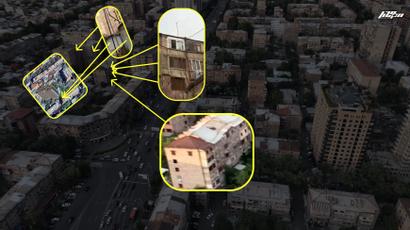
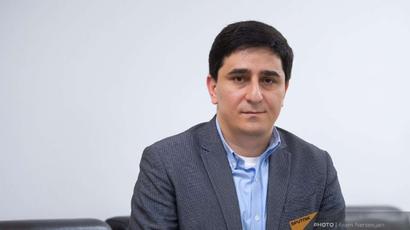
!["The fact of Artsakh not being part of Azerbaijan is of greater importance than concerns about food." [Blockade from the inside]](https://cdn.infocom.am/enlarge?file=2023-08-04-3e113b85-6b81-4589-b241-11323a00de2b.jpg&type=jpeg&width=410&height=230)
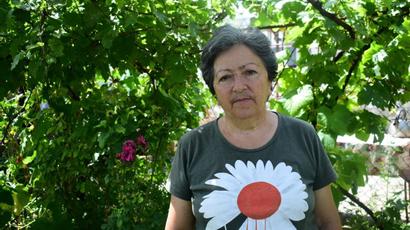
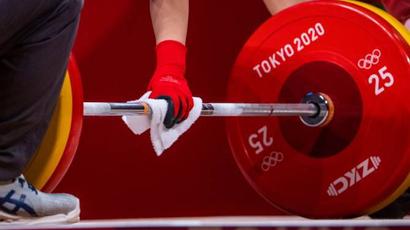
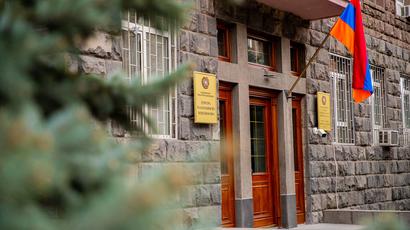
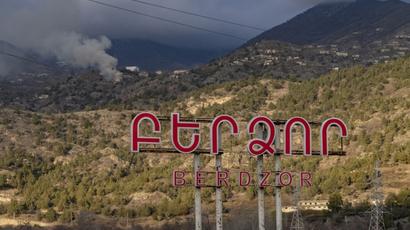
comment.count (0)